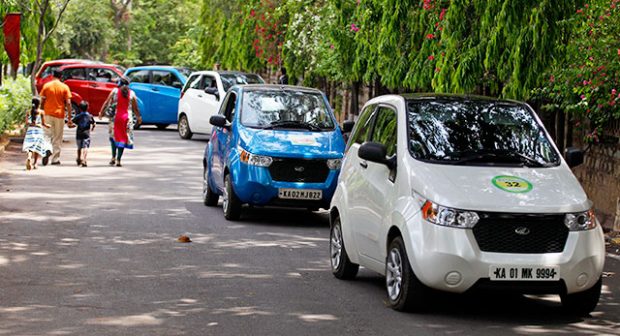India makes electric cars priority in the country

India’s most influential government think-tank has recommended lowering taxes and interest rates for loans on electric vehicles, while capping sales of conventional cars, signaling a dramatic shift in policy in one of the world’s fastest growing auto markets, Reuters said.
A draft of the 90-page blueprint, seen by Reuters, also suggests the government opens a battery plant by the end of 2018 and uses tax revenues from the sale of petrol and diesel vehicles to set up charging stations for electric vehicles.
The recommendations in a draft report by Niti Aayog, the planning body headed by Prime Minister Narendra Modi, are aimed at electrifying all vehicles in the country by 2032 and will likely shape a new mobility policy, said government and industry sources, Reuters reported.
The report’s focus solely on electric vehicles marks a shift away from the current policy that incentivises both hybrid vehicles – which combine fossil fuel and electric power – and electric cars, and is worrying some automakers, Reuters added.
“India’s potential to create a new mobility paradigm that is shared, electric and connected could have a significant impact domestically and globally,” said a draft version of the report, titled Transformative Mobility Solutions for India, which will be made public this week. India’s plan to leapfrog hybrid technology comes after China announced aggressive measures last year to push sales of plug-in vehicles including subsidies, research funding and rules designed to discourage fossil-fuel cars in big cities, according to Reuters.
It would also mark a radical response by India as it looks to cut its oil import bill to half by 2030 and reduce emissions as part of its commitment to the Paris climate treaty, Reuters added.
Officials acknowledge the blueprint faces challenges. High battery costs would push up car prices and a lack of charging stations and other infrastructure means car makers, who have been consulted on the proposals ahead of publication, would hesitate to make the necessary investment in the technology, Reuters explained.
“If we accelerate electric vehicle growth it will be a disruption for the auto sector and would require investment, but if we’re not able to adapt quickly we risk being net importers of batteries,” said a government source involved in the plans. “There has been resistance from car makers.”
India’s top-selling carmaker Maruti Suzuki has invested in so-called mild-hybrid technology, which makes less use of electric power than full hybrids, while Toyota Motor Corp sells its luxury hybrid Camry sedan in the country. Mahindra & Mahindra is the only manufacturer of electric vehicles in India, Reuters indicated.
How to submit an Op-Ed: Libyan Express accepts opinion articles on a wide range of topics. Submissions may be sent to oped@libyanexpress.com. Please include ‘Op-Ed’ in the subject line.
- Libya’s HCS invites applicants for key state roles - December 31, 2023
- UK calls on Iran to prevent escalation in Israel-Hamas conflict - November 05, 2023
- Libyan Interior Minister: Immigrant shelter costs a fortune - November 05, 2023


